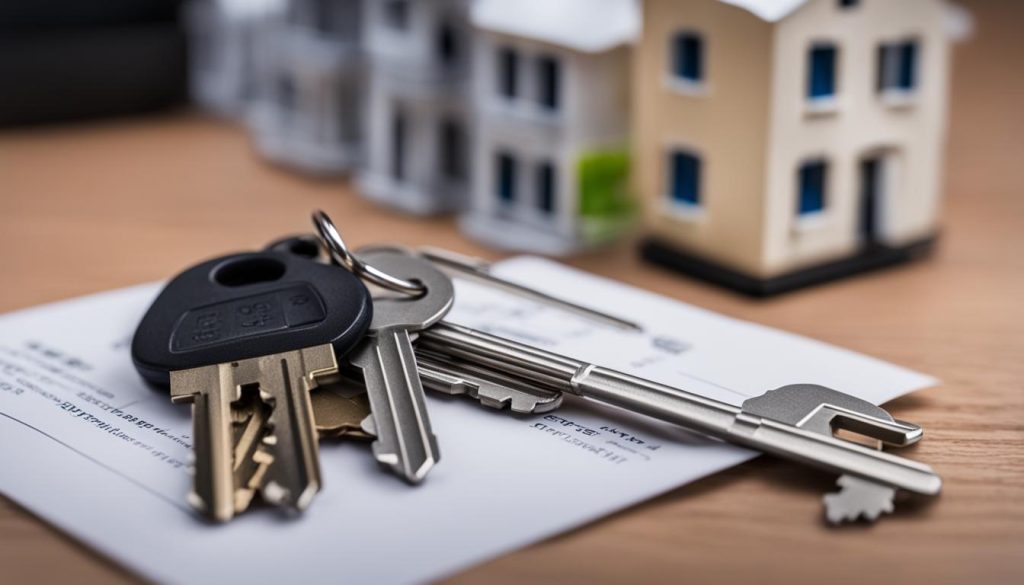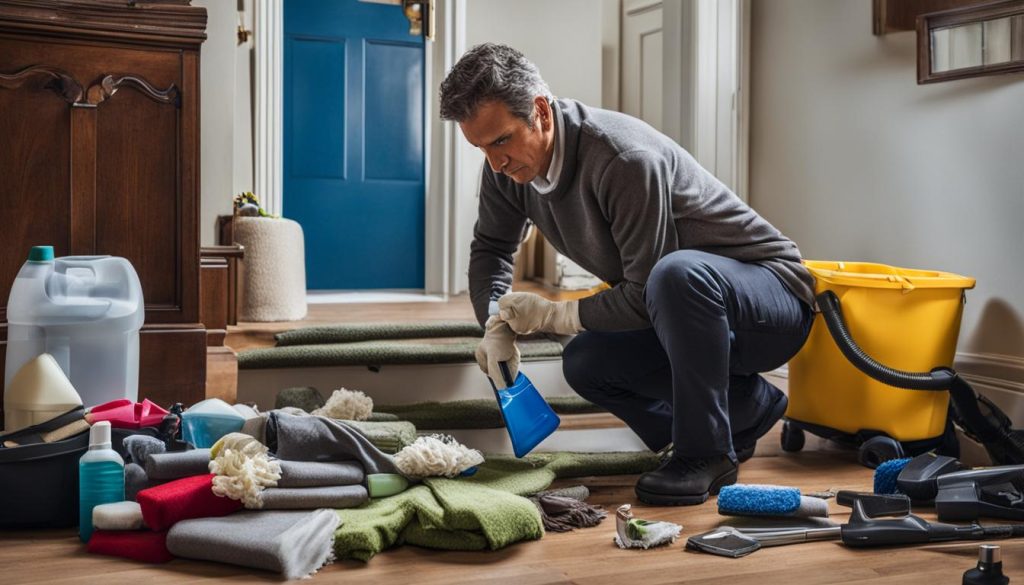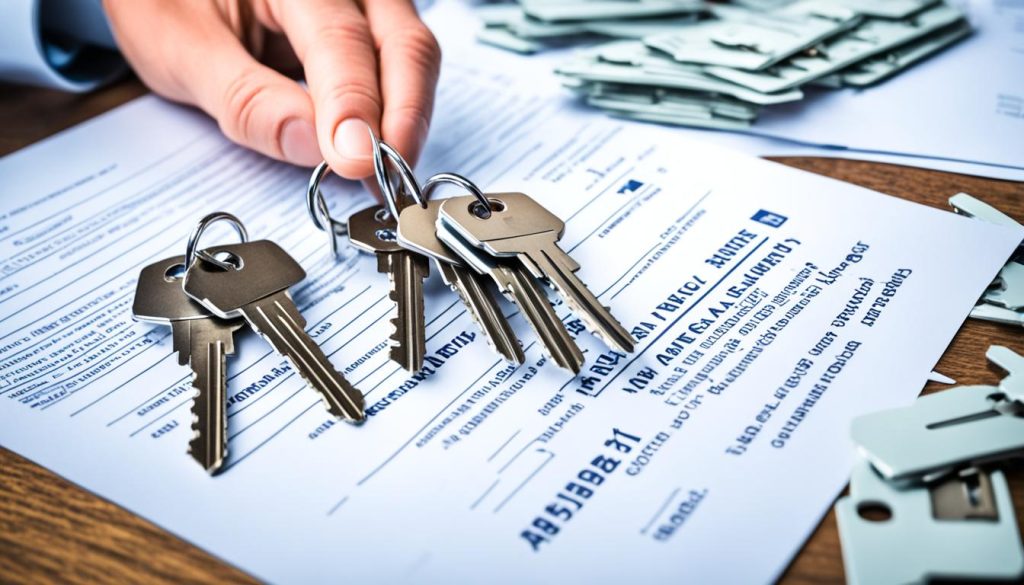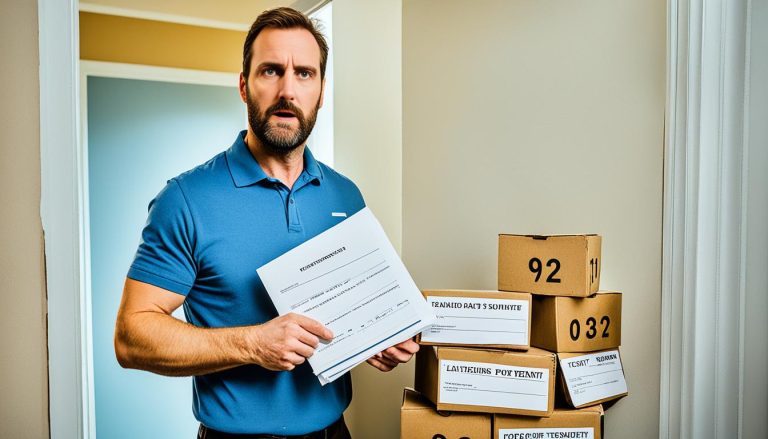Welcome to this informative article that will shed light on the reasons a landlord can keep your deposit in the UK. If you’re a tenant in the UK, you might have wondered what deductions can be made from your deposit and what rights you have in deposit disputes. We will also provide an overview of the tenancy deposit protection scheme, which ensures the safeguarding of your deposit. Let’s dive in and explore!
Tenancy Deposit Protection Scheme in the UK
In the United Kingdom, the tenancy deposit protection scheme is a vital safeguard for both tenants and landlords. This scheme was introduced to ensure that tenants’ deposits are protected and that there is a fair process in place for handling disputes between tenants and landlords regarding deposit deductions.
The purpose of the tenancy deposit protection scheme is twofold: to safeguard tenants’ deposits and to provide a transparent and impartial resolution process in case of disputes. By participating in this scheme, landlords are required to protect their tenants’ deposits through a government-approved tenancy deposit protection scheme provider.
Under the rental deposit protection regulations in the UK, landlords must protect their tenants’ deposits within 30 days of receiving them. They are also responsible for providing tenants with specific information about the protection scheme, including the name and contact details of the scheme provider, within the same timeframe. Failure to comply with these regulations can result in penalties for the landlord.

The tenancy deposit protection scheme ensures that tenants have recourse in case of deposit disputes. If a tenant believes that their landlord has made an unfair deduction from their deposit, they can raise a dispute with the relevant tenancy deposit protection scheme provider. The scheme provider will then facilitate the resolution process, which may involve negotiation, mediation, or, if necessary, arbitration.
By understanding the tenancy deposit protection scheme in the UK, tenants can feel confident that their deposits are safeguarded and that they have a fair process in place for addressing any deposit disputes that may arise.
Key Obligations of Landlords under the Tenancy Deposit Protection Scheme:
- Protect tenants’ deposits within 30 days of receiving them
- Provide tenants with information about the deposit protection scheme
- Comply with the resolution process in case of deposit disputes
| Key Features of the Tenancy Deposit Protection Scheme in the UK | Benefits for Tenants | Benefits for Landlords |
|---|---|---|
| 1. Deposit protection | 1. Ensures fair treatment and protection of tenants’ deposits | 1. Demonstrates compliance with legal requirements |
| 2. Impartial resolution process | 2. Provides a transparent and fair process for handling disputes | 2. Facilitates swift and efficient resolution of deposit disputes |
| 3. Clear guidelines and regulations | 3. Provides clarity on tenant rights and landlord obligations | 3. Ensures landlords are aware of their legal responsibilities |
What Reasons Can a Landlord Keep My Deposit UK?
When it comes to rental agreements, understanding the reasons why a landlord may deduct from your deposit is essential. By being aware of these common deductions, you can better anticipate what amount might be withheld from your deposit. In this section, we will explore some of the typical issues that can lead to deposit deductions in the UK.
1. Unpaid Rent
One of the most common reasons for deposit deductions is unpaid rent. If you have outstanding rent payments at the end of your tenancy, a landlord may withhold a portion of your deposit to cover the arrears. It is important to ensure that all rent payments are made on time to avoid this deduction.
2. Property Damages
Damage to the property beyond normal wear and tear can also result in deposit deductions. This includes any significant damage caused by tenants, such as broken windows, holes in walls, or damaged fixtures. Landlords may deduct from the deposit to cover the costs of repairs or replacements.
3. Cleaning Costs
Another common deduction relates to cleaning costs. If the property is left in a dirty or unclean condition, a landlord may withhold a portion of the deposit to cover professional cleaning expenses. It is advisable to ensure the property is thoroughly cleaned before moving out to avoid this deduction.
4. Outstanding Bills
Outstanding utility bills or other expenses that are the tenant’s responsibility can also lead to deposit deductions. If there are any unpaid bills at the end of the tenancy, the landlord may use a portion of the deposit to settle these financial obligations.
Understanding these common deposit deductions in the UK can help you prepare financially and ensure that you take appropriate measures to avoid unnecessary deductions. By fulfilling your obligations as a tenant and maintaining the property in good condition, you can increase your chances of receiving your full deposit refund.
5. Missing Items or Furnishings
Most properties come with an inventory detailing all furniture and appliances included in the rental. If any items are missing or damaged beyond normal usage, landlords can claim from the deposit for replacement or repair costs.
For instance:
- Missing furniture pieces
- Broken kitchenware
- Appliances that were broken during your tenancy
Keeping a copy of the initial inventory and noting the condition of items can help prevent disputes.
6. Breach of Tenancy Agreement
If you breach any terms outlined in your tenancy agreement, the landlord has grounds to make deductions from your deposit. Common breaches might include:
- Keeping pets when prohibited
- Having additional tenants without permission
- Not adhering to noise regulations
It’s critical to understand your tenancy agreement fully and ask for clarification on any points you don’t understand.
7. Notice Period Not Given
Most tenancy agreements specify a notice period that tenants must adhere to when they plan to vacate the property. If you leave without giving the required notice, the landlord can deduct from your deposit to cover loss of potential rent for that period.
To avoid this issue, always provide written notice following the procedures stated in your tenancy agreement.
8. Neglect or Poor Maintenance
If the condition of the property has deteriorated due to tenant neglect, landlords may seek to cover repair costs from the deposit. This could involve:
- Damage caused by poor ventilation leading to mould
- Failure to report maintenance issues that could have prevented further damage (e.g., leaks)
Being proactive about maintenance and promptly reporting any issues during your tenancy can help mitigate this risk.

Your Rights as a Tenant in Deposit Disputes
As a tenant in the UK, it is important to be aware of your rights in deposit disputes. If you believe your landlord is unfairly withholding your deposit, there are several steps you can take to address the issue and seek a fair resolution.
1. Communicate with Your Landlord
The first step is to open a line of communication with your landlord regarding the deposit dispute. Clearly state your concerns and provide any evidence or documentation that supports your claim. It is crucial to maintain a respectful and professional tone throughout the conversation to encourage constructive dialogue.
2. Gather Evidence
When facing a deposit dispute, gather as much evidence as possible to support your case. This may include photographs, videos, or written records that document the condition of the property before and after your tenancy. In addition, keep any relevant correspondence with your landlord or letting agent regarding the deposit.
3. Seek Mediation or Arbitration
If direct communication with your landlord fails to yield a satisfactory resolution, consider seeking mediation or arbitration services. Mediation involves a neutral third party who assists in facilitating a compromise between you and your landlord. Arbitration, on the other hand, involves a decision made by an independent adjudicator based on the evidence provided.
4. Know Your Rights
Understanding your rights as a tenant in deposit disputes is essential. In the UK, landlords must protect your deposit by placing it in a government-approved tenancy deposit protection scheme. They are required to provide you with information about the scheme within 30 days of receiving your deposit. If your landlord fails to comply with these regulations, you may be entitled to compensation.
- You have the right to request the return of your deposit within 10 days of the end of your tenancy.
- Your landlord must provide a detailed explanation of any deductions made from your deposit.
- If you disagree with the deductions, you can raise a dispute with the tenancy deposit protection scheme.
- The scheme will act as an impartial party and make a decision based on the evidence provided.
- If the decision is in your favor, the scheme will ensure the return of your deposit.
By understanding your rights and taking appropriate actions, you can navigate deposit disputes with confidence and increase the chances of a fair outcome.
How to Secure the Return of Your Tenancy Deposit?
Securing the return of your tenancy deposit is essential to ensure that you receive your hard-earned money back in full. By following a few key steps, you can increase the likelihood of a successful deposit return. Here are some practical tips:
- Conduct a thorough inventory: Before moving into the property, meticulously document the condition of each room and take photographs or videos as evidence. This will help you prove the existing state of the property at the start of your tenancy.
- Communicate with your landlord: Establish open lines of communication with your landlord from day one. Regularly update them on any maintenance issues that arise, ensuring that necessary repairs are promptly addressed. This proactive approach demonstrates your commitment to maintaining the property.
- Keep the property clean and well-maintained: Throughout your tenancy, prioritize cleanliness and keep the property well-maintained. Regularly clean all areas, including carpets, appliances, and communal spaces. Address any minor repairs or damages promptly to prevent them from escalating.
- Report any damages: If you notice any damages caused by factors beyond your control, such as structural issues or faulty plumbing, inform your landlord immediately. Providing prompt notice will protect you from being held responsible for such damages.
- Understand the tenancy deposit protection scheme: Familiarize yourself with the tenancy deposit protection scheme in the UK. Ensure that your landlord has protected your deposit with a recognized scheme within the required timeframe. This protection ensures that your deposit is safeguarded and provides a dispute resolution process if necessary.
- Keep all communication in writing: When addressing any issues or requests related to your tenancy, communicate with your landlord in writing, such as email or registered letters. This creates a paper trail and helps you maintain a record of all interactions and agreements.
- Attend the final inspection: When your tenancy is coming to an end, request a final inspection with your landlord. This allows both parties to assess the property’s condition together and resolve any potential disputes regarding damages or cleanliness.
By following these steps, you can increase the chances of securing the return of your tenancy deposit. Remember, clear communication, proactive maintenance, and thorough documentation are key to a successful deposit refund. Protect your rights as a tenant and ensure a fair resolution in case of any disputes.

Example Tenancy Deposit Checklist:
| Task | Checklist |
|---|---|
| Conducting inventory | – Take detailed photos or videos of each room’s condition – Note any existing damages or issues |
| Communication with landlord | – Maintain open lines of communication – Provide regular updates on maintenance issues |
| Maintaining cleanliness | – Regularly clean all areas of the property – Pay attention to carpets, appliances, and communal spaces |
| Reporting damages | – Inform the landlord promptly of any damages beyond your control |
| Tenancy deposit protection | – Verify that your deposit is protected within a recognized scheme |
| Written communication | – Keep records of all communication in writing |
| Final inspection | – Request a joint final inspection with the landlord |
Tips for Preventing Deposit Disputes
Preventing deposit disputes with your landlord is essential for a smooth tenancy experience. By following these helpful tips, you can minimize the risk of deposit deductions and maintain a positive relationship with your landlord.
Maintain the Property
One of the best ways to prevent deposit disputes is by taking care of the property throughout your tenancy. Regularly clean and tidy your living space to avoid unnecessary cleaning costs when you move out. Report any maintenance issues or damages promptly to your landlord, ensuring they are aware of any necessary repairs.
Fulfill Your Responsibilities
As a tenant, it’s important to fulfill your responsibilities outlined in the tenancy agreement. Pay your rent on time and in full to avoid any potential disputes. Take care of the property, including fixtures, appliances, and furnishings. Keep in mind that any damages or excessive wear and tear beyond normal use may result in a deduction from your deposit.
Communicate Effectively
Clear and timely communication with your landlord can help prevent misunderstandings and disputes. If you have any concerns or questions regarding your tenancy, address them promptly. Keep a record of all communication, including emails, letters, or text messages, to serve as evidence in case of a dispute.
Create a Thorough Inventory
Before moving in, create a comprehensive inventory of the property’s condition. Take photos or videos of every room and note any existing damages or issues. Share this inventory with your landlord and keep a copy for yourself. When you move out, compare the condition of the property to the initial inventory to resolve any disagreements about damages.
Understand the Tenancy Deposit Protection Scheme
Being aware of the tenancy deposit protection scheme in the UK is crucial. The scheme safeguards your deposit and provides a mechanism for resolving disputes. Familiarize yourself with your landlord’s obligations regarding deposit protection and understand the process for raising a dispute if necessary.
By following these tips, you can reduce the likelihood of deposit disputes and ensure a smoother and more transparent tenancy experience.

Can Landlord Keep Deposit for Unpaid Rent UK?
If a tenant has unpaid rent, landlords in the UK can indeed make deductions from the security deposit. This is one of the primary reasons that allows them to retain part or all of your deposit upon moving out. The purpose is to cover any financial losses incurred due to non-payment.
However, landlords must provide evidence of the unpaid rent when making such deductions. They cannot simply assume tenants owe money; documentation and proper communication are key elements. It’s essential for both parties to maintain clear records throughout the tenancy.
Tenants should be aware that while unpaid rent justifies a deduction, it needs to align with what was agreed upon in the original tenancy agreement. Understanding these stipulations helps prevent disputes later on regarding deposit returns.
Can Landlord Deduct Deposit for Painting UK?
Landlords can deduct from your deposit for painting, but certain conditions apply. If the property requires a fresh coat of paint due to excessive wear and tear or damage caused during your tenancy, they may have valid grounds for this deduction.
However, normal wear and tear should not result in deductions. Fading paint or minor scuffs that occur over time are typically viewed as part of regular use. The landlord must provide evidence showing that the need for repainting stems directly from tenant actions rather than general deterioration.
It’s also crucial to check the inventory report completed at the start of your tenancy. This document often outlines the property’s condition beforehand and serves as a reference point when evaluating any potential deductions related to painting costs.
Can Landlord Charge More Than Deposit for Damages UK?
When a tenant causes damage beyond the normal wear and tear, landlords may seek compensation. However, they cannot simply charge more than the deposit without justification. The law requires that any deductions from the deposit are reasonable and reflective of actual repair costs.
If damages exceed the deposit amount, landlords must follow proper procedures to claim additional funds. This typically involves providing evidence of the damage and associated repair costs. Tenants have the right to dispute these claims if they believe charges are excessive or unjustified.
It’s essential for both parties to document property conditions before moving in and out. This documentation can help clarify what constitutes fair wear and tear versus actual damage during tenancy, preventing disputes over extra charges later on.
Can Landlord Deduct Deposit for Cleaning?
Landlords can deduct cleaning costs from your deposit if the property is left in an unclean state beyond normal wear and tear. This means that major cleaning issues, such as dirty carpets or grime-covered surfaces, may justify withholding part of your deposit. However, routine cleaning should not incur charges.
It’s essential to understand what constitutes acceptable cleanliness when you vacate a rental property. If the home was professionally cleaned before your tenancy began, landlords might expect it to be returned in similar condition.
Tenants have rights under tenancy agreements and guidelines provided by deposit protection schemes. Always take photos of the property’s condition upon moving out as evidence for any disputes regarding cleanliness deductions from your deposit.
Conclusion
In conclusion, understanding the valid reasons a landlord can keep your deposit in the UK is crucial for tenants. By familiarizing yourself with deposit deductions, the tenancy deposit protection scheme, and your rights in deposit disputes, you can protect your deposit and ensure a fair resolution.
It is important to follow best practices to secure the return of your deposit and prevent disputes. Conducting a thorough inventory and documenting the condition of the property at the beginning and end of your tenancy can provide evidence in case of disagreements. Additionally, open communication with your landlord throughout the tenancy can help address any concerns before they escalate into deposit disputes.
By being proactive and responsible tenants, you can minimize the risk of having deductions made from your deposit. Take care of the property, report any maintenance issues promptly, and fulfill your responsibilities as outlined in your tenancy agreement. This will not only protect your deposit but also foster a positive relationship with your landlord.
FAQ
How does the tenancy deposit protection scheme work in the UK?
The tenancy deposit protection scheme in the UK was introduced to ensure that tenants’ deposits are protected and fairly handled. Landlords are legally required to place your deposit in a government-approved deposit protection scheme within 30 days of receiving it. This scheme ensures that your deposit is returned promptly at the end of the tenancy or helps resolve any disputes between landlords and tenants.
What are my rights as a tenant in deposit disputes?
As a tenant, you have rights in deposit disputes. If you believe your landlord is unfairly withholding your deposit, you can first communicate with them to understand their reasons. If you cannot reach a resolution, you can escalate the matter to the deposit protection scheme’s dispute resolution service, which offers free mediation or adjudication to resolve the dispute impartially.
How can I secure the return of my tenancy deposit?
To increase the likelihood of getting your deposit back in full, it is essential to take certain steps. Before moving in, conduct a thorough inventory and document the condition of the property with dated photographs or videos. Throughout the tenancy, maintain the property and report any issues promptly to your landlord. Communicate openly with your landlord and keep records of any correspondence that may be relevant in case of disputes.
What are some tips for preventing deposit disputes?
To prevent deposit disputes with your landlord, it is important to be proactive and responsible. Fulfill your responsibilities as a tenant, such as paying rent on time and abiding by the terms of the tenancy agreement. Take good care of the property, perform regular cleaning, and report any maintenance issues promptly. By doing so, you can minimize the risk of deposit deductions and disputes.






